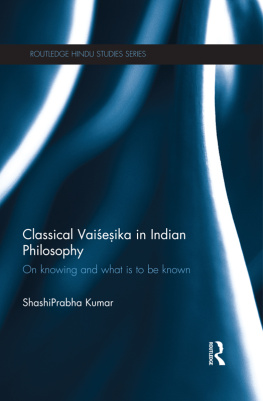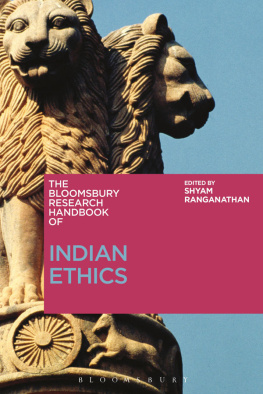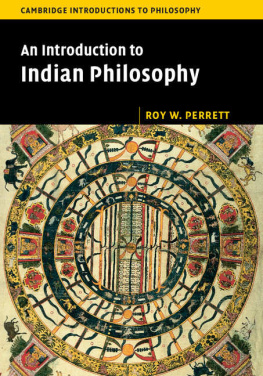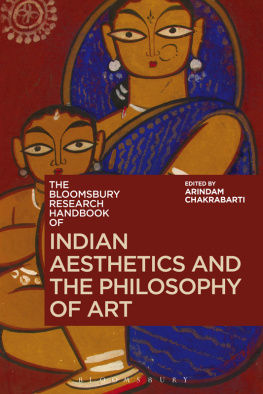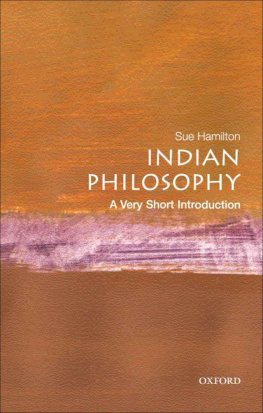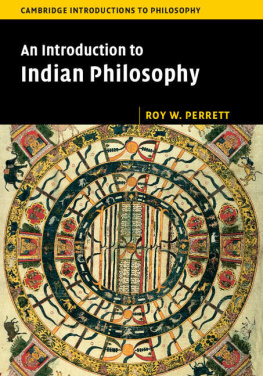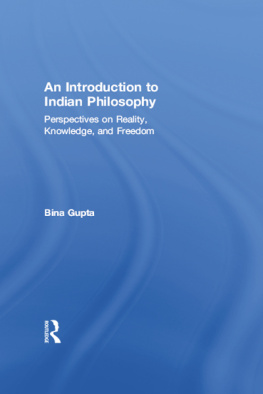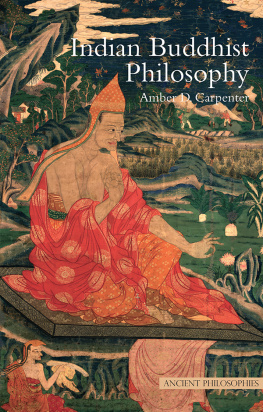Indian Epistemology and Metaphysics
Also available from Bloomsbury
The Bloomsbury Research Handbook of Indian Aesthetics and the Philosophy of Art,
Arindam Chakrabarti
The Bloomsbury Research Handbook of Indian Ethics,
Shyam Ranganathan
The Collected Writings of Jaysankar Lal Shaw: Indian Analytic and Anglophone Philosophy,
edited by Jaysankar Lal Shaw
An Introduction to Indian Philosophy,
Christopher Bartley
Indian Epistemology and Metaphysics
Edited by
Joerg Tuske
Bloomsbury Academic
An imprint of Bloomsbury Publishing Plc

Contents
Piotr Balcerowicz, of no nationality (which he emphasizes), is professor of philosophy and Indian studies, currently based in Warsaw, Poland. He specializes in the Indian philosophical tradition, with emphasis on epistemological thought and Jainism. He teaches Indian philosophy and Indian religion, as well as intercultural relations, conflict resolution, and contemporary history of South Asia, Central Asia, and the Middle East. He has published extensively on Indian philosophy and religion, especially Jainism, but also on the Middle East and Central Asia and Afghanistan. Since 2002, with his NGO Education for Peace, he has been involved in various development cooperation projects in Afghanistan, Pakistan, Burma/Myanmar, and Africa.
Joel Feldman was born in New York City in 1968. He received a BA from Hampshire College in 1994 and a PhD in philosophy from the University of Texas at Austin in 2003. He is currently associate professor of philosophy at Rider University, where he has been teaching since 2004. He is coauthor of Ratnakrtis Proof of Momentariness by Positive Correlation: Transliteration, Translation, and Philosophic Commentary (2011).
Eli Franco is the director of the Institute for Indology and Central Asian Studies, Leipzig University, and a member of the Saxon Academy of Sciences. He has published extensively on various traditions of Indian philosophy, especially on Lokyata and the Buddhist epistemological tradition. He is the author of Perception, Knowledge and Disbelief: A Study of Jayaris Scepticism (1987 and 1994); Dharmakrti on Compassion and Rebirth (1997); The Spitzer Manuscript: The Oldest Philosophical Manuscript in Sanskrit (2004); Dharmakrti on the Duality of the Object (2014; with Miyako Notake). His editorial work includes Beyond Orientalism: The Work of Wilhelm Halbfass and Its Impact on Indian and Cross-Cultural Studies (1997; with Karin Preisendanz); Yogic Perception, Meditation and Altered States of Consciousness (2009); From Turfan to Ajanta. Festschrift for Dieter Schlingloff on the Occasion of his Eightieth Birthday (2010; with Monika Zin); Religion and Logic in Buddhist Philosophical Analysis, Proceedings of the 4th International Dharmakrti Conference (2011; with Helmut Krasser et al.); and Historiography and Periodization of Indian Philosophy (2013).
Jay L. Garfield is Kwan Im Thong Hood Cho Temple Professor of humanities and head of studies in philosophy at Yale-NUS College, professor of philosophy at the National University of Singapore, recurrent visiting professor of philosophy at Yale University, Doris Silbert Professor in the humanities and professor of philosophy at Smith College, professor of philosophy at Melbourne University, and adjunct professor of philosophy at the Central University of Tibetan Studies. Garfields most recent books include Engaging Buddhism: Why It Matters to Philosophy (2014); Madhyamaka and Yogcra: Allies or Rivals? (2015; edited, with Jan Westerhoff); The Moon Points Back: Buddhism, Logic and Analytic Philosophy (2015; edited, with Yasuo Deguchi, Graham Priest and Koji Tanaka); Indian Philosophy in English from Renaissance to Independence (2011, with Nalini Bhushan); and Contrary Thinking: Selected Papers of Daya Krishna (2011, edited with Nalini Bhushan and Daniel Raveh).
Pradeep P. Gokhale retired as professor from the Department of Philosophy, University of Pune, in 2012. Since then he has been working as Dr. B. R. Ambedkar Research Professor in the Central University of Tibetan Studies, Sarnath, Varanasi, India. He is the author of Inference and Fallacies Discussed in Ancient Indian Logic (With Special Reference to Nyya and Buddhism); Vdanyya of Dharmakrti (The Logic of Debate); Hetubindu of Dharmakrti (A Point on Probans); coauthor of Recollection, Recognition and Reasoning (A Study in the Jaina Theory of Paroka-prama); the editor of: The Philosophy of Dr. B. R. Ambedkar; and coeditor of Studies in Jainism and Indian Moral Philosophy: Problems, Concepts and Perspectives. He is also the author of many books and articles in Marathi. These books and articles pertain to themes in Classical Indian philosophy, social and moral philosophy and philosophy of religion.
Birgit Kellner has been director of the Institute for Cultural and Intellectual History of Asia at the Austrian Academy of Sciences in Vienna since 2015. Her research focuses on Buddhist epistemology and logic in India in its interaction with non-Buddhist philosophies, and on Tibetan adaptations and interpretations of Indian Buddhist thought. She has worked especially on the knowledge of nonexistence (the pivotal concept being non-apprehension, anupalabdhi), and on the nature and structure of consciousness and cognition, as epitomized in controversies surrounding the status of aspects (kra) and the notion of reflexive awareness or svasavedana. Kellner earned her degrees from the Universities of Vienna (Tibetan and Buddhist Studies, Mag. phil. 1994) and Hiroshima (Indian Philosophy, PhD 1999), and subsequently pursued her research on Buddhist epistemology, logic, and the philosophy of mind in the framework of various prestigious research fellowships and projects in Vienna and Hamburg. After an appointment as visiting assistant professor at UC Berkeley she became professor for Buddhist studies at the University of Heidelberg in 2010 before taking up her present position.
Matthew MacKenzie is associate professor of philosophy at Colorado State University. He works in the areas of Buddhist philosophy, Indian philosophy, and philosophy of mind.
Keya Maitra is professor and chair of the Department of Philosophy at University of North Carolina, Asheville. Her current research interests include Indian philosophy, philosophy of mind, Third World feminism, and feminist philosophy of mind. She has published articles in Asian Philosophy, Hypatia, Philosophy in the Contemporary World, Southwest Philosophy Review, and International Journal of Philosophical Studies along with edited volumes. She contributed On Putnam (2002) to the Wadsworth Philosophers Series. Her recent publications include Mindfulness, Antman and the Possibility of a Feminist Self-Consciousness and The Questions of Identity and Agency in Feminism with Borders: A Mindful Response. Her The Philosophy of the Bhagavad-Gt containing a fresh translation of the Hindu text Bhagavad-Gt prepared for philosophers is forthcoming. She is coediting the volume Feminist Philosophy of Mind. She also received a Fulbright-Nehru Academic and Professional Excellence Senior Research Award to India to work on her project on the epistemology of mindfulness.
Claus Oetke was born in Germany and trained at the University of Hamburg (Germany) in Indology, philosophy, and Sinology. He was awarded a doctorate in 1973, following which he was a lecturer (wissenschaftlicher Assistent) at the Institute for Culture and History of India and Tibet in Hamburg until 1983. He received a habilitation in 1983 and professorship at the same institute. He served as a short-term visiting professor in Vienna (Austria) and Kiel (Germany). From 1987 until 1992 he held the Heisenberg Professur of the Deutsche Forschungsgemeinschaft (DFG), which led to visiting professorships at the University of Pennsylvania (Philadelphia, USA), The Australian National University in Canberra (Australia), and the University of Texas at Austin (USA). From 1993 until January 2014, he was the head of the Department of Indian and Tibetan Studies at the University of Stockholm. Since February 2014 he has been professor emeritus of the University of Stockholm. His main topics of research include Tibetan translations from Chinese Buddhist texts, problems of person and self in the Indian philosophical tradition, studies in early Madhyamaka-Buddhism, Indian theories of inference and proof (Indian Logic), theoretical issues of interpretation, and linguistic semantics.
Next page

